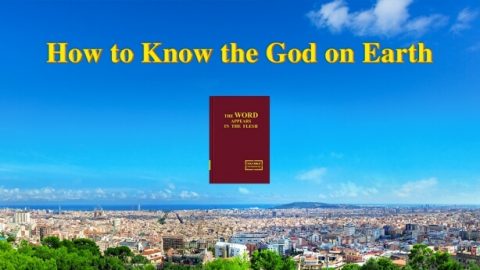e. How the Bible came about, and whether it was God’s work that came first or the Bible
Words of Almighty God of the Last Days
After God did the work of the Age of Law, the Old Testament was produced, and it was then that people began to read the Bible. After Jesus came, He did the work of the Age of Grace, and His apostles wrote the New Testament. Thus were the Old and New Testaments of the Bible produced, and even unto today, all those who believe in God have been reading the Bible. The Bible is a book of history. Of course, it also contains some of the foretelling of prophets, and such foretelling is by no means history. The Bible includes several parts—there is not just prophecy, or only the work of Jehovah, nor are there only the Pauline epistles. You must know how many parts the Bible includes; the Old Testament contains Genesis, Exodus…, and there are also the books of prophecy that the prophets wrote. At the end, the Old Testament finishes with the Book of Malachi. It records the work of the Age of Law, which was led by Jehovah; from Genesis to the Book of Malachi, it is a comprehensive record of all the work of the Age of Law. Which is to say, the Old Testament records all that was experienced by the people who were guided by Jehovah in the Age of Law. During the Old Testament Age of Law, the great number of prophets raised up by Jehovah spoke prophecy for Him, they gave instructions to various tribes and nations, and foretold the work that Jehovah would do. These people who had been raised up had all been given the Spirit of prophecy by Jehovah: They were able to see the visions from Jehovah, and hear His voice, and thus they were inspired by Him and wrote prophecy. The work they did was the expression of the voice of Jehovah, the expression of the prophecy of Jehovah, and Jehovah’s work at the time was simply to guide people using the Spirit; He did not become flesh, and people saw nothing of His face. Thus, He raised up many prophets to do His work, and gave them oracles that they passed on to every tribe and clan of Israel. Their work was to speak prophecy, and some of them wrote down Jehovah’s instructions to them to show to others. Jehovah raised these people up to speak prophecy, to foretell the work of the future or the work still to be done during that time, so that people could behold the wondrousness and wisdom of Jehovah. These books of prophecy were quite different from the other books of the Bible; they were words spoken or written by those who had been given the Spirit of prophecy—by those who had gained the visions or voice from Jehovah. Apart from the books of prophecy, everything else in the Old Testament is made up of records made by people after Jehovah had finished His work. These books cannot stand in for the foretelling spoken by the prophets raised up by Jehovah, just as Genesis and Exodus cannot be compared to the Book of Isaiah and the Book of Daniel. The prophecies were spoken before the work had been carried out; the other books, meanwhile, were written after the work had been finished, which was what people were capable of. The prophets of that time were inspired by Jehovah and spoke some prophecy, they spoke many words, and they prophesied the things of the Age of Grace, as well as the destruction of the world in the last days—the work that Jehovah planned to do. The remaining books all record the work done by Jehovah in Israel. Thus, when you read the Bible, you are mainly reading about what Jehovah did in Israel; the Bible’s Old Testament primarily records Jehovah’s work of guiding Israel, His use of Moses to guide the Israelites out of Egypt, who rid them of the Pharaoh’s shackles, and took them out into the wilderness, after which they entered Canaan and everything following this was their life in Canaan. All apart from this is made up of records of Jehovah’s work throughout Israel. Everything recorded in the Old Testament is Jehovah’s work in Israel, it is the work Jehovah did in the land in which He made Adam and Eve. From when God officially began to lead the people on earth after Noah, all that is recorded in the Old Testament is the work of Israel. And why is there not recorded any work beyond Israel? Because the land of Israel is the cradle of mankind. In the beginning, there were no other countries apart from Israel, and Jehovah did not work in any other place. In this way, what is recorded in the Old Testament of the Bible is purely God’s work in Israel at that time. The words spoken by the prophets, by Isaiah, Daniel, Jeremiah, and Ezekiel … their words foretell His other work on earth, they foretell the work of Jehovah God Himself. All this came from God, it was the work of the Holy Spirit, and apart from these books of the prophets, everything else is a record of people’s experiences of Jehovah’s work at the time.
—The Word, Vol. 1. The Appearance and Work of God. Concerning the Bible (1)
At the time, Jesus had done much work that was incomprehensible to His disciples, and had not provided any explanation. After He left, the disciples began to preach and work everywhere, and for the sake of that stage of work, they began writing the epistles and the books of gospel. The books of gospel of the New Testament were recorded twenty to thirty years after Jesus was crucified. Before, the people of Israel only read the Old Testament. That is to say, at the beginning of the Age of Grace people read the Old Testament. The New Testament only appeared during the Age of Grace. The New Testament did not exist when Jesus worked; the people after He was resurrected and ascended to heaven recorded His work. Only then were there the Four Gospels, in addition to which were also the epistles of Paul and Peter, as well as the Book of Revelation. More than three hundred years after Jesus ascended to heaven, subsequent generations collated these documents selectively, and only then was there the New Testament of the Bible. Only after this work had been completed was there the New Testament; it did not exist previously. God had done all that work, and Paul and the other apostles had written so many epistles to the churches at various locations. People after them combined their epistles, and appended the greatest vision recorded by John on the island of Patmos, in which was prophesied God’s work of the last days. People made this sequence, which is different from the utterances of today. What is recorded today is according to the steps of God’s work; what people engage with today is the work personally done by God, and the words personally uttered by Him. You—mankind—do not need to interfere; the words, which come directly from the Spirit, have been arranged step by step, and are different from the arrangement of man’s records. What they recorded, it can be said, was according to their level of education and human caliber. What they recorded was the experiences of men, and each had their own means of recording and knowing, and each record was different. Thus, if you worship the Bible as God you are extremely ignorant and stupid! Why do you not seek the work of the God of today? Only the work of God can save man. The Bible cannot save man, people could read it for several thousand years and still there would not be the slightest change in them, and if you worship the Bible you will never gain the work of the Holy Spirit.
—The Word, Vol. 1. The Appearance and Work of God. Concerning the Bible (3)
During the time of Jesus, Jesus led the Jews and all those who followed Him according to the Holy Spirit’s work in Him at the time. He did not take the Bible as the basis of what He did, but spoke according to His work; He paid no heed to what the Bible said, nor did He search in the Bible for a path to lead His followers. Right from when He began to work, He spread the way of repentance—a word of which there was absolutely no mention in the prophecies of the Old Testament. Not only did He not act according to the Bible, but He also led a new path, and did new work. Never did He refer to the Bible when He preached. During the Age of Law, no one had ever been able to perform His miracles of healing the sick and casting out demons. So, too, were His work, His teachings, and the authority and power of His words beyond any man in the Age of Law. Jesus simply did His newer work, and even though many people condemned Him using the Bible—and even used the Old Testament to crucify Him—His work surpassed the Old Testament; if this were not so, why did people nail Him to the cross? Was it not because it said nothing in the Old Testament of His teaching, and His ability to heal the sick and cast out demons? His work was done to lead a new path, it was not to deliberately pick a fight against the Bible, or to deliberately dispense with the Old Testament. He simply came to perform His ministry, to bring the new work to those who yearned for and sought Him. He did not come to explain the Old Testament or uphold its work. His work was not in order to allow the Age of Law to continue developing, for His work gave no consideration to whether it had the Bible as its base; Jesus simply came to do the work that He ought to do. Thus, He did not explain the prophecies of the Old Testament, nor did He work according to the words of the Old Testament Age of Law. He ignored what the Old Testament said, He cared not whether it agreed with His work or not, and cared not what others knew of His work, or how they condemned it. He simply kept doing the work that He ought to do, even though many people used the foretelling of the prophets of the Old Testament to condemn Him. To people, it appeared as if His work had no basis, and there was much of it that was at odds with the records of the Old Testament. Was this not man’s error? Does doctrine need to be applied to the work of God? And must God work according to the foretelling of prophets? After all, which is greater: God or the Bible? Why must God work according to the Bible? Could it be that God has no right to exceed the Bible? Can God not depart from the Bible and do other work? Why did Jesus and His disciples not keep the Sabbath? If He were to practice in light of the Sabbath and according to the commandments of the Old Testament, why did Jesus not keep the Sabbath after He came, but instead washed feet, covered head, broke bread, and drank wine? Is this not all absent from the commandments of the Old Testament? If Jesus honored the Old Testament, why did He break with these doctrines? You should know which came first, God or the Bible! Being the Lord of the Sabbath, could He not also be the Lord of the Bible?
The work done by Jesus during the time of the New Testament began new work: He did not work according to the work of the Old Testament, nor did He apply the words spoken by Jehovah of the Old Testament. He did His own work, and He did newer work, and work that was higher than the law. Thus, He said: “Think not that I am come to destroy the law, or the prophets: I am not come to destroy, but to fulfill.” Thus, in accordance with what He accomplished, much doctrine was broken with. On the Sabbath when He took the disciples through the grain fields, they picked and ate the heads of grain; He did not keep the Sabbath and said “the Son of man is Lord even of the sabbath day.” At the time, according to the rules of the Israelites, whosoever did not keep the Sabbath would be stoned to death. Jesus, however, neither entered the temple nor kept the Sabbath, and His work had not been done by Jehovah during the time of the Old Testament. Thus, the work done by Jesus exceeded the law of the Old Testament, it was higher than it, and was not in accordance with it. During the Age of Grace, Jesus did not work according to the law of the Old Testament, and had already broken with those doctrines. But the Israelites clung fiercely to the Bible and condemned Jesus—was this not denying the work of Jesus? Today, the religious world also clings fiercely to the Bible, and some people say, “The Bible is a holy book, and it must be read.” Some people say, “God’s work must be upheld forever, the Old Testament is God’s covenant with the Israelites, and cannot be dispensed with, and the Sabbath must always be kept!” Are they not ridiculous? Why did Jesus not keep the Sabbath? Was He sinning? Who can thoroughly understand such things? No matter how people read the Bible, it will be impossible to know the work of God using their comprehension ability. Not only will they not gain a pure knowledge of God, but their notions will become ever more egregious, such that they will begin to oppose God. If it were not for the incarnation of God today, people would be ruined by their own notions, and they would die amid God’s chastisement.
—The Word, Vol. 1. The Appearance and Work of God. Concerning the Bible (1)
If you wish to see the work of the Age of Law, and to see how the Israelites followed the way of Jehovah, then you must read the Old Testament; if you wish to understand the work of the Age of Grace, then you must read the New Testament. But how do you see the work of the last days? You must accept the leadership of the God of today, and enter into the work of today, for this is the new work, and no one has previously recorded it in the Bible. Today, God has become flesh and selected other chosen ones in China. God works in these people, He continues on from His work on earth, and continues on from the work of the Age of Grace. The work of today is a path that man has never walked, and a way that no one has ever seen. It is work that has never been done before—it is God’s latest work on earth. Thus, work that has never been done before is not history, because now is now, and has yet to become the past. People do not know that God has done greater, newer work on earth, and outside of Israel, that it has already gone beyond the scope of Israel, and beyond the foretelling of the prophets, that it is new and marvelous work outside of the prophecies, and newer work beyond Israel, and work that people can neither perceive nor imagine. How could the Bible contain explicit records of such work? Who could have recorded every single bit of today’s work, without omission, in advance? Who could have recorded this mightier, wiser work that defies convention, in that moldy old book? The work of today is not history, and as such, if you wish to walk the new path of today, then you must depart from the Bible, you must go beyond the books of prophecy or history in the Bible. Only then will you be able to walk the new path properly, and only then will you be able to enter into the new realm and the new work. … The new utterances can provide for you, which proves that this is the new work; the old records cannot sate you, or satisfy your current needs, which proves that they are history, and not the work of the here and now. The highest way is the newest work, and with the new work, no matter how high the way of the past, it is just history that people are looking back on, and no matter its value as reference, it is still the old way. Even though it is recorded in the “holy book,” the old way is history; even though there is no record of it in the “holy book,” the new way is of the here and now. This way can save you, and this way can change you, for this is the work of the Holy Spirit.
—The Word, Vol. 1. The Appearance and Work of God. Concerning the Bible (1)




